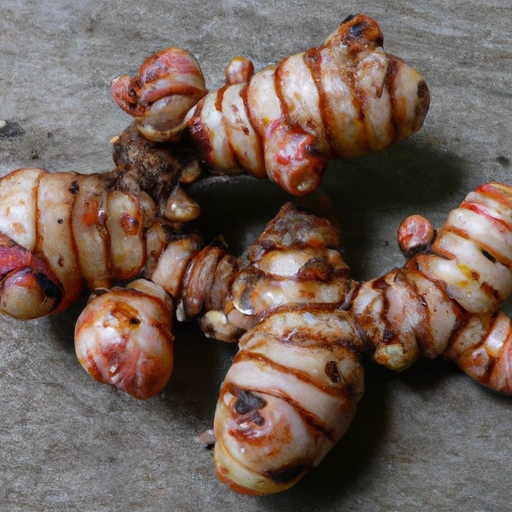Galangal
Description

Galangal, often referred to as 'Thai ginger,' is a rhizome that is closely related to ginger and turmeric. Known for its sharp, peppery flavor with hints of citrus, it is a staple ingredient in Southeast Asian cuisine. Galangal can be used fresh, dried, or powdered and is commonly found in Asian markets around the world. It's not only celebrated for its unique taste but also for its potential health benefits.
Common uses
Galangal is most commonly used in the cuisines of Southeast Asia, including Thai, Indonesian, and Malaysian dishes. It is an essential component in curry pastes, soups such as Tom Kha Gai, and is often paired with ingredients like lemongrass, coconut milk, and chili peppers.
Nutritional value
Calories
A 100g serving of fresh galangal contains approximately 45 calories (188 kJ).
Protein
Galangal provides around 1 gram of protein per 100g serving.
Fat
This spice contains a minimal amount of fat, with less than 1 gram per 100g.
Carbohydrates
Galangal has about 11 grams of carbohydrates per 100g, most of which are dietary fiber.
Vitamins
While not a significant source of vitamins, galangal does contain small amounts of Vitamin C.
Minerals
It offers a modest array of minerals, including iron, sodium, and potassium.
Health benefits
Galangal has been traditionally used for its anti-inflammatory properties and is believed to aid in digestion, reduce nausea, and even combat the common cold. Its antioxidant properties are also noted for potentially reducing the risk of certain chronic diseases.
Potential risks
As with any food ingredient, moderation is key. Galangal is generally safe when consumed in typical culinary amounts. However, excessive consumption could lead to gastrointestinal discomfort or allergic reactions in some individuals.
Common recipes
Popular recipes using galangal include Thai curry pastes, Tom Kha Gai soup, Indonesian rendang, and various stir-fries.
Cooking methods
Galangal can be used fresh, sliced or minced, as well as dried or powdered. It is often sautéed or simmered to infuse its flavors into dishes.
Pairing with other ingredients
It pairs well with coconut milk, lemongrass, garlic, shallots, and proteins such as chicken, fish, and seafood.
Summary
Galangal is a versatile spice that adds a vibrant flavor profile to a variety of dishes. With its rich history and numerous health benefits, it is an excellent ingredient to explore for those looking to expand their culinary horizons. Whether used in traditional Asian recipes or incorporated into modern cuisine, galangal is sure to make a flavorful impact.